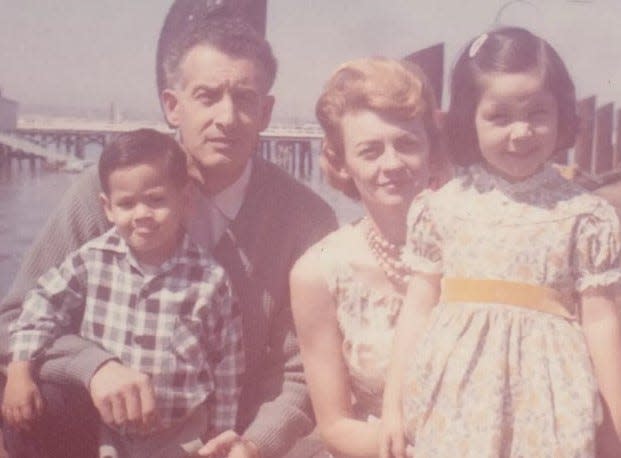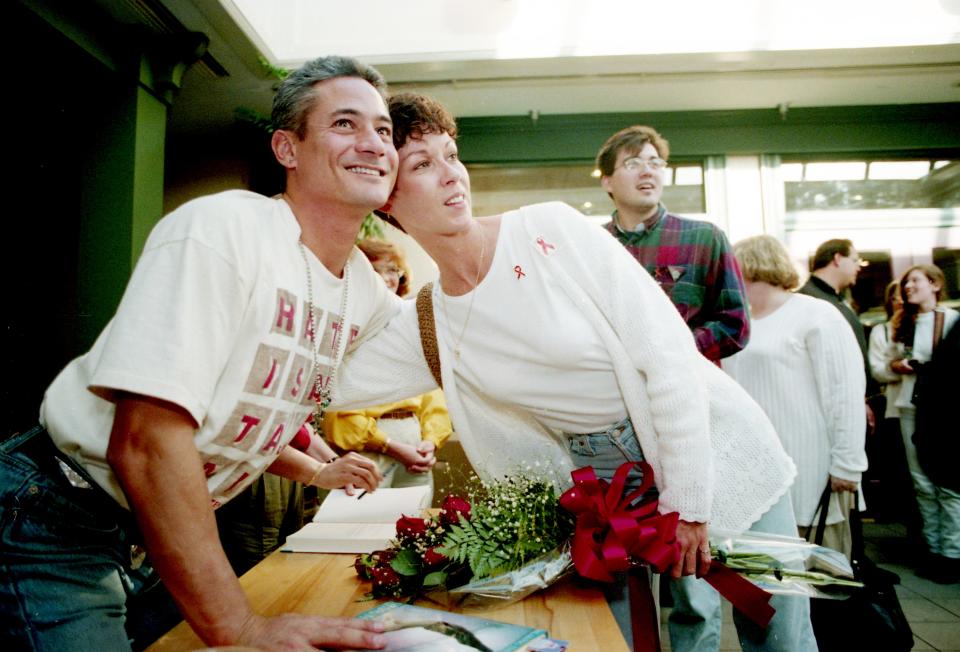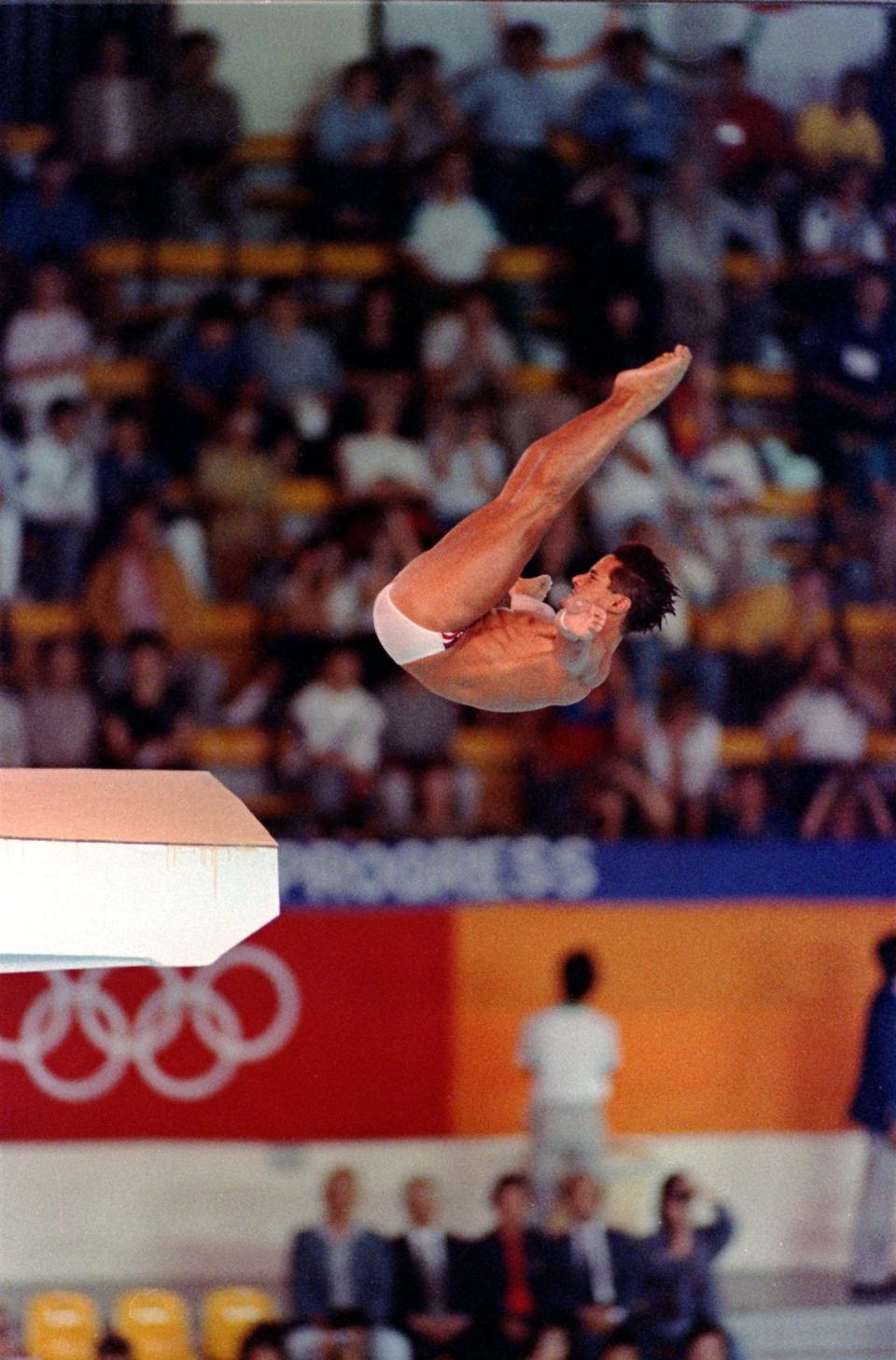Amid terror of his secret HIV diagnosis, Greg Louganis competed in 1988 Olympics, won gold
INDIANAPOLIS --Greg Louganis sat in the doctor's office in January 1988, the HIV test already administered, the results looming and his mind racing. He sat there plotting out his next two years should the doctor walk in and say the words: You are HIV positive.
Barely 28, Louganis was sure two years was the best he could hope for. In 1988, HIV was a mysterious, scary, isolating virus that, in its final stages, turned to AIDS and left people dying alone in hospital beds, ostracized by family and friends. It was known mostly as a gay man's disease, an intravenous drug user's disease, a disease that took lives in rapid succession and in despair.
As he sat in the doctor's office, Louganis wondered if he would reach the age of 30 and he wondered whether there would be another medal. At the time, he was in Florida training for the 1988 Seoul Olympics, an elite diver considered one of the greatest in his sport having won two gold medals in 1984.
As long as that HIV test said what Louganis hoped it would say, another medal was sure to come. But as he awaited the results, Louganis planned for the worst.
"If I was positive, I was going to do the honorable thing, pack my bags, lock myself in the house and wait to die," Louganis, now 62, told IndyStar last week in advance of his visit to Indianapolis to speak on World AIDS Day Dec. 1. "That's what we thought. HIV was a death sentence."

Louganis had gone to the doctor amid intense Olympic training. His ears had been bothering him, but there was something else. His partner back in California, where Louganis lived when he wasn't training, was having trouble breathing. Respiratory problems, shortness of breath and coughing were common in people with HIV. At the doctor for his ears, Louganis asked to be tested anonymously for HIV.
He didn't expect to be positive. "Being who I am, I'm more of a serial monogamist," Louganis said. "I attach to someone and that’s it."
But when the doctor walked into the room with no easy way to say what he had to say, Louganis told him the plan.
"I'm going to pack up and leave," Louganis said, everything around him a blur. "I don’t want to waste anybody's time, my coach, my teammates and potentially take a spot from someone else on the Olympic team."
His doctor, who was also Louganis' cousin, reined him in.
"You don’t know how long you’ve been HIV positive," he told Louganis. "The healthiest thing would be to continue training, focus on your goals, the Olympics."
Louganis put aside his initial rash decision and forged ahead into the water, telling no one other than his coach Ron O'Brien, though Louganis tried to hide it from O'Brien at first.
"My coach sensed something was wrong," said Louganis. "He asked me, 'What’s going on?' He sat me down. I told him my HIV status and we both cried."
'Secrets isolate you'
Through the tears, O'Brien urged Louganis to keep going forward, to not quit on his dream of another Olympic gold medal. Louganis reluctantly agreed.
"That was easier for me, to put my energy toward something positive to look forward to," Louganis said, rather than counting down the days until he became a frail shell of himself and died. "So I focused on the training."
His doctor took care of the medical side of the things, the drugs and the appointments. O'Brien took care of the diving side of things, pushing Louganis, never giving him an out, never trying to coddle him because he was HIV positive.
And in 1988, eight months after his diagnosis, amid the terror of this virus that raged inside his body, with a secret the world didn't know, Louganis went to Seoul to compete in the Olympics.

During the preliminary round in the 3-meter competition, Louganis hit his head on the diving board, cutting his scalp and suffering a concussion. It was a moment of terror for both Louganis and O'Brien.
Had the Olympic Committee known that Louganis had HIV, O'Brien later said, he would not have been allowed to compete.
Louganis came back from that injury to win two gold medals, saying at the time he had worked too hard to give up.
His feat of four gold medals, sweeping the springboard and platform titles at the Olympics in 1984 and 1988, along with 47 national championships, made Louganis a superstar.
People called him the greatest American diver in history. And Louganis smiled as he stood on the podium with medals dangling around his neck.
But behind the smile, Louganis still had a secret.
He would keep that secret from the world for the next six years, never quite finding the right time to reveal he had HIV and holding everything in until he felt like he might explode.
"I feel like I'm living on an island with barely a phone to the outside world because of the secrets," Louganis remembers saying at the time. "Secrets isolate you."
He knew that well. Louganis had held a secret before.
'There's judgment surrounding you'
As a young boy, Louganis didn't know he was gay. "I just knew I was different, just listening to conversations socially. I didn’t put sexuality to it. I was too young," he said. "But I just always felt kind of separate."
Louganis had been adopted at nine months old. Maybe that's why he felt different, he would tell himself. Maybe his biological parents didn't love him enough to keep him.
He later found out that his biological parents were unmarried teenagers who met in Hawaii. When his biological mother became pregnant with him, she moved to San Diego, single and with no means to raise him. She did what she thought was best for Louganis. He spent the first nine months of his life in foster care.
"Then Pete and Frances adopted me," Louganis said. "That really changed my life."

Peter and Frances Louganis, unable to have biological children, adopted a daughter and then Louganis. They gave their children the world, a loving home, discipline and the fun stuff -- dance, acrobatics, gymnastics and diving.
Louganis was barely two years old when he snuck into the studio where his sister was practicing dance and acrobatics. He started imitating what the students were doing. The teacher noticed and said he could stay. By the time Louganis was three, he had his first performance on stage.
Dance and acrobatics led to gymnastics. The family had a pool in the backyard and Louganis would practice his gymnastic stunts off the board and into the pool.
When he was 12, Louganis was diagnosed with Osgood–Schlatter disease, an inflammation of the area just below the knee where the tendon from the kneecap attaches to the shinbone.
Because intense sports can cause it to worsen, doctors told Louganis' parents he should quit dance, acrobatics and gymnastics but he could continue diving because the board gave and he was landing in the water.
"So all of that energy that was going out to all these other disciplines," Louganis said, "went into diving."
As he spent any waking moment he could in the water, Louganis began to realize why he felt different. He was in his mid-teens when he started questioning his sexuality. It wasn't hard to find the answer. He knew.

"The first person that you come out to is yourself," Louganis said. "Recognizing this is who I am. But it’s difficult. When you’re gay, there is that underlying message that you're wrong and that there’s judgment surrounding you."
Louganis told those close to him that he was gay. But as he racked up national championships, as he won those four Olympic gold medals, he wasn't out to the world.
Years kept ticking by until the calendar said 1994 and, at the age of 34, Louganis had two secrets. He was gay and he was HIV positive and he was ready, finally, to let the world know.
'Letting go of those secrets'
Louganis' coming out happened after a health scare in 1993 when he started losing weight and "wasting away." Louganis told his partner and mother that they could throw him a birthday party. He thought it would be a goodbye to the people he loved.
Instead, after going to a Florida hospital and checking in under an assumed name, Louganis got on the right medications and he thrived.

He landed the role of Darius in the play "Jeffrey" in New York City. Night after night for six months, Louganis played an out, gay man who dies of AIDS.
After Darius dies in the play, his spirit returns to the lead character Jeffrey and delivers what Louganis said was a powerful message, "Telling Jeffrey to hate AIDS, not life."
The play was a blessing to Louganis. It was his time, like Darius, to be out, too.
In a pre-taped announcement shown at the opening ceremony of the 1994 Gay Games, Louganis publicly came out as gay. Months later in a 1995 interview with Barbara Walters, Louganis spoke publicly for the first time about being gay and HIV-positive. The interview aired just before the release of his memoir, "Breaking the Surface."
Coming out, revealing his HIV status, writing the book, Louganis says, "was about letting go of those secrets. Because I knew in my heart I wasn’t the only one. There were others out there with similar stories, that fear of being judged, ostracized. It was kind of a scary time."
But, Louganis said, there were wonderful havens all around for people battling HIV. One of those was the Damien Center in Indianapolis, one of the oldest and largest AIDS service organizations in the country. The center was founded in 1987 and, through the years, has worked to prevent the spread of HIV.
“Greg personally owning his HIV status has provided a beacon of hope to those living with it, proving that an HIV diagnosis does not mean that your life is over,” said Alan Witchey, president and CEO of the Damien Center, which is bringing Louganis to Indianapolis as part of its educational series. “His work on HIV awareness and LGBTQ+ issues has empowered a generation to end the HIV epidemic."

The Damien Center is looking to expand, to reach more people. Louganis is in awe of what the center does and he wants to help. That is why he is coming to Indianapolis to share his HIV journey.
Louganis's story is a tough one. There was depression along the way and several suicide attempts. And a fear that consumed him.
"Honestly, when I was diagnosed HIV positive, I didn’t think I would see my 30th birthday," Louganis said. "I knew I wasn’t going to see 30."
But here he is at 62 with four gold medals and an incredible story to tell. And a passion to help others fight, let go of the secrets and live.
See Louganis speak, help Damien Center
-- Louganis will speak in Indianapolis on World AIDS Day, Dec. 1, as part of Damien Center’s Educational Series at the Skyline Club at 7 p.m.
-- General admission tickets are $25 each. Tickets for a VIP reception that includes hors d'oeuvres, two drink tickets and a meet and greet with Louganis prior to his speech are $100 each. Purchase tickets.
-- Louganis is also auctioning off some of his medals through Dec. 4, with a portion of the proceeds going to the Damien Center.
Follow IndyStar sports reporter Dana Benbow on Twitter: @DanaBenbow. Reach her via e-mail: dbenbow@indystar.com.
This article originally appeared on Indianapolis Star: Greg Louganis coming to Indy on World AIDS Day to tell his HIV story

